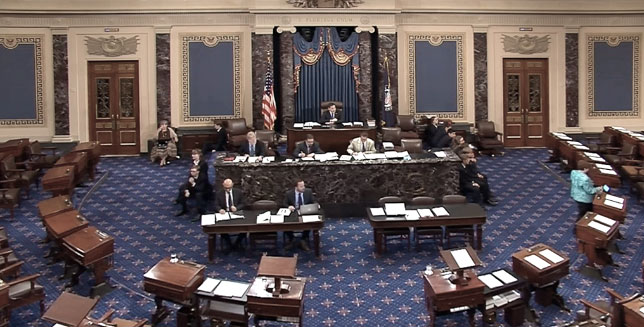
|
||
 SENATE SESSION, SEPTEMBER 8, 2016“Republicans gear up for fight against internet transition,” Ashley Gold and Tony Romm reporting in the POLITICO today. “Republicans in Congress are barreling toward a September showdown with the White House over its plan to give up oversight of the internet… the Commerce Department might not try to find a legal workaround to any ban imposed by lawmakers. He [Deputy Secretary of Commerce Bruce Andrews] also said the agency is keeping an eye on potential lawsuits.”
SENATE SESSION, SEPTEMBER 8, 2016“Republicans gear up for fight against internet transition,” Ashley Gold and Tony Romm reporting in the POLITICO today. “Republicans in Congress are barreling toward a September showdown with the White House over its plan to give up oversight of the internet… the Commerce Department might not try to find a legal workaround to any ban imposed by lawmakers. He [Deputy Secretary of Commerce Bruce Andrews] also said the agency is keeping an eye on potential lawsuits.”
— “NTIA has argued it hasn’t violated the congressional restrictions by making plans for the transition.” NTIA’s chief, Larry Strickling told POLITICO congress should not delay the process any further. “It’s important for the future of the Internet that the transition not be blocked on Sept. 30 ... the delay would be ‘giving a gift to Russia and China.’ ... government had spent ‘two years developing a plan,’ and abandoning it would ‘hurt the credibility of America in the eyes of the rest of the world.’”
— “House Republicans have been vocal on the issue as well. On the first day Congress came back into session this week, Rep. Marsha Blackburn (R-Tenn.) delivered a floor speech on the importance of stopping the transfer of authority.”
— Update: “Sen. Ted Cruz (R-Texas) wasted no time on Thursday in hammering the Obama administration’s deal to relinquish supervision of the Internet Corporation for Assigned Names and Numbers (ICANN) on the Senate floor,” reports Ali Breland this afternoon in The Hill: A national security expert “argued that U.S. supervision of ICANN and IANA would give some countries a political excuse to attempt to intervene in the affairs of the organizations, but that they would have no such leverage in the hands of an international body.”
— “Senator Cruz’ campaign against the IANA transition is, in many ways, the gift that keeps on giving,” writes Michele Neylon: “Unfortunately, however, Cruz is an able orator. Earlier today Cruz addressed the US Senate and while his speech is full of misleading rhetoric, and some gross factual inaccuracies, you can see how a good orator could win over an audience. If you’re already predisposed to believing the rhetoric and aren’t familiar with how ICANN, domain names or the internet as a whole functions, then you could come away from that speech and feel that what he’s saying makes a lot of sense. And you might even believe that the internet is under threat. The fact that what he’s saying is just plain wrong, and on so many levels, won’t matter to that segment of the US body politique that swallows this kind of rhetoric whole and without question.”
— “What happens if the IANA contract is renewed and the transition doesn’t occur on September 30?” Kieren McCarthy reporting in The Register this evening: “Well, that all depends on what happens with the presidential elections. The official Republican platform has taken a very strong position against the IANA transition, meaning that a President Trump would almost certainly seek to prevent it from happening. Hillary Clinton’s position is less clear, although it is likely she supports the current administration’s position and would probably push for the transition to take place. The other big factor, of course, is what happens with Congress.”
— “Inaccurate rhetoric must not short-circuit internet transition,” writes Kathryn Brown, President and CEO of the Internet Society, in an op-ed piece on Friday. “The IANA transition is about the technical coordination of the naming, numbering and protocol system. It is a function governments and other Internet stakeholders have long agreed is best left to the Internet’s technical community. In fact, I would argue that there is no one able to run these functions other than the technical community. Moreover, since the Internet’s inception, there has been global agreement that no government or intergovernmental group should control it.”
— No “U.S. is not ‘handing over’ the internet,” warns Andrew Sullivan in TechCrunch, Friday, Sep 9: “The companies, organizations and individuals that actually use the functions have agreed that the U.S. government involvement isn’t needed. To be clear, this coordination only works because everyone agrees to it voluntarily – and if the U.S. insists on inserting itself, those using the function could agree to do things another way. In fact, in a reversal from the stereotype of a bureaucracy seeking ever-expanding power, the government agency that would be tasked with this role agrees that the plan to implement the functions without the U.S. government would work just fine. Unfortunately, those advancing arguments for U.S. involvement demonstrate fundamental misunderstandings about how the internet works. Indeed, continued U.S. government involvement in this function makes it more likely, not less, that the outcomes critics seek to avoid – including interference by foreign government in the operation of the internet – would come to pass.”
Sponsored byDNIB.com

Sponsored byCSC

Sponsored byVerisign

Sponsored byRadix

Sponsored byIPv4.Global

Sponsored byWhoisXML API

Sponsored byVerisign
